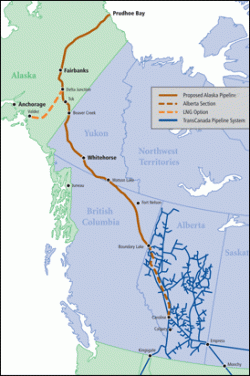On Friday, there was an interesting op-ed from the New York Times on Sarah Palin’s resignation written by an Alaskan of Inupiat and Lithuanian descent, William L. Iggiagruk Hensley. He is the chair of the First Alaskans Institute and has written a number of books on Alaska’s native people. In his article, Hensley applies the word Inuit “qivit” to Palin. It sounds like the English “quit,” but the term in Inuit actually has a rather harsher definition. It means
“to quit or give up when the going gets rough. In traditional times, and that was very recent, if you gave up as a leader you were jeopardizing yourself and everyone around you. It takes a lot of effort to maintain life in the bitter cold of the Arctic.”

Proposed TransCanada Pipeline
As Hensley points out, the Inuit have been living in the High North for millennia; Sarah Palin lasted 2.5 years in office.
As a result of her leaving the highest office in the state of Alaska, plans for a 1700-mile long natural gas pipeline have fallen into jeopardy. This pipeline was supposed to transport natural gas from Prudhoe Bay on the northern coast of Alaska (where the resource-rich Alaskan North Slope lies) to the continental United States via Canada. It would have been built by TransCanada, a company headquartered in Calgary, Alberta. Palin now passes the task of creating a pipeline on to Lieutenant Governor Sean Parnell, who was once a lobbyist for ConocoPhillips. Of course, even if Palin had remained in office, the pipeline deal still wouldn’t have been set in stone. The governor was still waiting for the approval of two indigenous tribes in Canada for the pipeline to pass through their lands, and it is uncertain whether they would have acquiesced.
Meanwhile, there is a joint project between ConocoPhillips and BP to develop a privately-owned pipeline, the Denali Alaska Gas Pipeline. Billed as “the largest private construction project in North America History,” the pipeline will travel 2,000 miles from Prudhoe Bay to Alberta, and then possibly extend down to Chicago. With both the TransCanada and the ConocoPhillips/BP projects, there are worries that much of the natural gas will go to fund extraction of oil sands in Alberta, home to the large Athabasca oil sands deposit.

Proposed Denali Pipeline